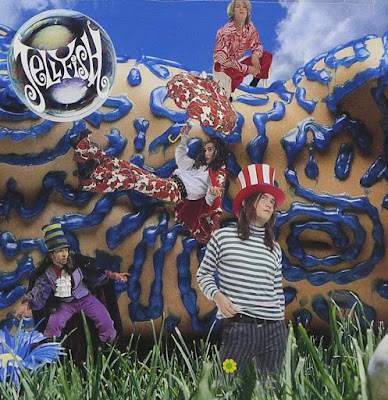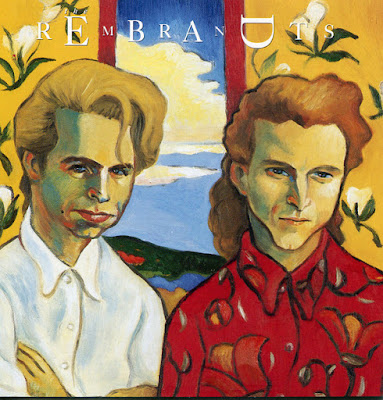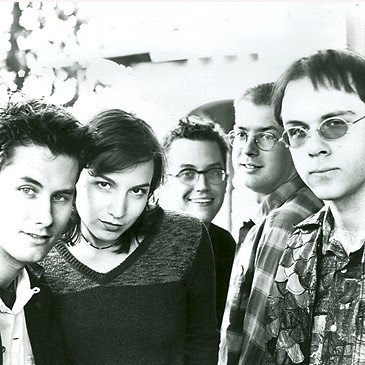In 1997, I was hired by Rhino Records for a freelance assignment to write liner notes for a compilation CD called Poptopia! Power Pop Classics Of The '90s. It was one of three decade-specific pop collections released simultaneously. Jordan Oakes wrote liners for the '70s disc, John M. Borack wrote for the '80s disc, and Ken Sharp provided editorial supervision for the lot of them. Jordan, John, and Ken are pretty good company to keep, and I'm proud to have been associated with this project.
I wish I still had my original manuscript for the liner notes; at Rhino's request, the original included additional paragraphs discussing a few other acts the label had in mind to include on the CD, acts that Rhino was either unable to license or chose to omit. Here is my essay as it was published in the CD booklet.
The 1990s are the best of times to be a power pop fan.
Oh, you can scoff if you wish, but the evidence is incontrovertible. Aside from the plethora of classic pop reissues available now in greater abundance than ever before, the '90s have seen a veritable explosion of worthy acts working within the broad context of pure pop and power pop, vying for your heart, mind and wallet with unabashed hooks and harmonies, and a killer instinct that'll go for your throat if your heart won't answer.
Power pop, that increasingly generic catchphrase for melodic rock 'n' roll, has shed some of its excess baggage over the years. For one thing, the retro elements are far more subdued: you don't see a lot of skinny ties or mohair suits on pop bands nowadays. For another, pop is at long last starting to escape from its cult ghetto. Billboard did a report in '95 about power pop's apparent resurgence, and Tony Perkins' annual Poptopia! festival in L.A. promises to raise pop's profile even more. And, while massive pop mania remains an unlikely prospect, the upshot is that more cool bands are forming and playing, and more cool records are being made.
A lot more cool records are being made. While previous volumes in the Poptopia! series have the advantage of historical perspective, we're still right in the thick of things when it comes to '90s power pop. There's a desire to present as much of what's going on as space permits. But space simply won't permit a proper cross section of current successful pop acts, along with the lesser-known pop acts toiling in underserved anonymity. There are dozens upon dozens of worthy tracks, but this CD will only hold 18 of 'em.
So an attempt was made to balance the big names with the relative obscurities. Choices were made--some due to circumstances beyond Rhino's control (and pocketbook)--but it's hoped that the result offers a fair representation of what the pop scene sounds like in this last decade of the 20th century. It sounds pretty damned good to me, and if it's possible for you to listen to this in your car at full-throttle, well then, you've got the right idea.
Matthew Sweet has come a long way since we first heard of him in 1983, as a member of Oh-OK, the nearly forgotten Athens, GA band then principally known because one of the members was Michael Stipe's sister. Sweet put all of that behind him with his third album, 1991's Girlfriend, an engaging pop tour de force propelled by the guitar work of Richard Lloyd and Robert Quine (formerly of Television and Richard Hell and the Voidoids, respectively). The title track and "I've Been Waiting" are the kind of lush pop tunes you wanna hear over and over again.
If a bunch of informed pop pundits were to vote on the definitive pop albums of the '90s, one that is certain to appear on a majority of ballots would be Bellybutton, the 1990 debut from Jellyfish. They were an almost defiantly pop act, wallowing in trashy retro chic, but delivering the goods with unparalleled panache on wax. Bellybutton is loaded with willful cops from the Beatles/Beach Boys bag o' tricks, notably on the MTV faves "The King Is Half-Undressed" and "Baby's Coming Back," and on "That Is Why," the album's most brazenly Beatlesque tune. After a line-up change, Jellyfish recorded one more album, 1993's Spilt Milk, before ceasing to exist.
Q magazine described the music of Ride as "the missing link between The Monkees and Jesus And Mary Chain." This Oxford, England foursome evolved over a series of records for Sire, but embraced the pop ideal for one album only, 1992's Going Blank Again. The highlight of Going Blank Again is "Twisterella," a swirling, head-spinning popfest. Following this beguiling taste of a perfect single, Ride immediately forgot about pop entirely and rode into the sunset in 1995.
Gigolo Aunts started out as a relatively low-key power pop combo, as demonstrated by a quick spin of 1988's Everybody Happy, an overlooked but ace exercise in a-boppin' and a-poppin'. Since then, the Aunts cranked up the amps and raised the grunge quotient just a touch for 1994's Flippin' Out. "Cope" is an interesting illustration of the group's hard pop dichotomy at its best: even as they start to swagger in prototypical college-radio fashion, just when you think you've got the song pegged as an agreeable but standard alterna-rocker, that chorus comes outta nowhere to imbed its whale-size hooks into your soul.
It's unfair (and technically inaccurate), but history may wind up remembering The Rembrandts as mere one-hit wonders for "I'll Be There For You," their phenomenally popular theme song for the TV sitcom Friends. The duo of Danny Wilde and Phil Solem has been revered for their irresistible pop savvy ever since their days in the early '80s pop band Great Buildings. As The Rembrandts, they've released three albums of luxurious, melodic pop cast in the image of The Everly Brothers, and had a # 14 hit in 1991 with "Just The Way It Is, Baby." "Rollin' Down The Hill" is from their second album, 1992's Untitled, and it provides a perfect encapsulation of The Rembrandts' inviting, understated sound.
One of the more obscure acts on this compilation, The Tearaways evolved from a Santa Monica pop band called The Volcanos, and their simply awesome 1993 debut See The Sound (produced by 20/20-Three O'Clock veteran Earle Mankey) reveals a band eminently worthy of the widest possible attention. "Jessica Something" is but one of many alluring tracks on that debut, an album that all pop fans should immediately seek out with eager dispatch. While a touch less immediate than See The Sound, 1996's De La Vina nonetheless serves further notice that we should be keeping an eye and ear on these Tearaways.
With a glorious vocal blend that calls to mind the magnificence of The Hollies, The Posies have proven there's more to Seattle music than grunge and more grunge. While Posies Ken Stringfellow and Jon Auer's stint as members of the '90s touring version of Big Star is an impressive résumé item, it's still just a footnote to The Posies' own accomplishments. Though fans are divided over the merits of the group's early, smoother pop albums (1988's Failure and 1990's Dear 23) and the sharper edge added to 1993's Frosting On The Beater and 1996's Amazing Disgrace, Frosting On The Beater seems to be the most popular Posies work. "Solar Sister" is a proud representative of that long-player, its edge still sharp but its shiny pop sheen undiminished.
"If I had the Wondermints back in 1967, I would have taken Smile out on the road." What kind of band must Wondermints be to inspire such an unbelievably cool benediction from Brian Wilson--Brian friggin' Wilson!--pop's most holy patron saint himself? The Wondermints are probably the most acclaimed of all the acts in L.A.'s burgeoning power pop scene. The group's accomplished and avowedly pop approach, which combines tantalizing hints of every band you loved on AM radio in the '60s with a touch of early '80s new wave, was first released on a series of indie cassettes, and on their first 45, the superb, haunting "Proto-Pretty." This all-American group had to go all the way to Japan to get a record deal, though New York City's Big Deal label came through with a domestic release in late '96.
The Lemonheads have evolved from a nondescript posthardcore outfit into an engaging pop conglomeration centered around singer/guitarist Evan Dando. The group first founds its audience via a smirking cover of Simon & Garfunkel's "Mrs. Robinson" on 1992's It's A Shame About Ray. Come On Feel The Lemonheads (1993) gave us the juicy, jangly "Into Your Arms" and secured The Lemonheads' position as alternative-pop superstars. And, lest it be forgotten that a certain measure of Tiger Beat-style idolatry should be part and parcel of genuine pop mania, then you've gotta concede that Dando's good looks certainly didn't hurt the group's commercial prospects. (Though if one more joker refers to Dando as an "alterna-hunk," I'll personally swat said joker with a rolled-up Shaun Cassidy poster.)
Back when '70s nostalgia seemed ludicrous, brothers Jeffrey and Steven McDonald set about transforming their punkish combo Redd Kross into an aggressive post-punk pop band that seemed to draw equal inspiration from KISS and The Bay City Rollers. The McDonalds even appeared in 1991's '70s-revival flick The Spirit Of '76 with David Cassidy! Today, Redd Kross is rightly recognized as a potent pop powerhouse, capable of making little girls swoon on the one hand and raisin' the motherlovin' roof on the other. Both elements are displayed in "Lady In The Front Row," a souring treatise on rock 'n' roll stardom and fandom (from the group's ace 1993 Phaseshifter album), a track which cordially invites you to sway with cigarette lighter held high.
Both members of Jellyfish, albeit at different times, Jason Falkner and Jon Brion finally got to be in a band together when they formed The Grays, an act with a decidedly harder edge than that of the lads' goofier alma mater. The Grays' 1994 Ro Sham Bo album may have been a touch too heavy for some Jellyfish devotees, but tracks like "Same Thing," emblematic of the group's sound, did find an audience among more aggressive rockin' poppers.
The Rooks have become New York City's most notable pop act, beloved by the discerning few who know of the group's sublime work-- of singer/guitarist Michael Mazzarella's nonpareil pop originals and Kristin Pinell's shimmering guitar leads. "Reasons" was first heard on the band's debut album The Rooks, and it's distinguished by a drop-dead gorgeous chorus that will convince you the late Chris Bell and Gene Clark are harmonizing along from beyond this mortal coil. By the time you read this, The Rooks will have a new album out from the visionary Not Lame label.
The unfortunate fate of The Greenberry Woods offers a sobering reminder that even the best pop bands can still be resolutely ignored by the buying public. Maryland's favorite pop sons released two absolutely dreamy albums--1994's Rapple Dapple and 1995's Big Money Item--only to be met with appalling indifference by retail and radio. Following the group's apparent demise, a couple members resurfaced in a new group called Splitsville, and released an interesting, cartoony debut album on Big Deal in '96. But Splitsville ain't a proper substitute for The Greenberry Woods, whose passing we mourn here with a spin of their signature tune "Trampoline," an impossible-to-resist barrage of singalong charm and halcyon AM-pop style. Come back, guys!
On the more alternative side of pop, Velocity Girl offers a sound that Rolling Stone described as "haunting yet hummable noise pop." The group has done a whole passel o' records for Sub Pop, with "I Can't Stop Smiling" coming to us from 1994's ¡Simpatico! It may not be power pop in the traditional Beatles/Who/Beach Boys/Big Star sense, but it sure is catchy nonetheless.
With frank Big Star moves in its music and an album, 1994's Teenage Symphonies To God, named for Brian Wilson's long-ago description of his goals for The Beach Boys' aborted Smile LP, Velvet Crush makes no secret of its influences. This Rhode Island trio has made a name for itself as a confident purveyor of Big Star/Byrds janglepop while avoiding mere imitation. "Hold Me Up," from Teenage Symphonies To God, is the group's best-known track.
Vancouver pop band Zumpano plays an almost giddily pleasant pastiche of '60s pure pop, recalling scads of Turtles and Grass Roots 45s spun on the neighbor girl's Close-N-Play record machine. The incongruity of such a clean-sounding pop act recording for Sub Pop, a label that usually favors at least a bit more grit in its grooves, didn't stop 1995's Look What The Rookie Did from being a delightfully sugary confection, guaranteed to get your fingers to snappin' and your teeth to rottin'. "The Party Rages On" is a wonderfully cheery kiss-off, the nicest sounding hit-the-road-ya-crumb ditty to come down the pike in recent memory.
Chapel Hill, NC's native son Rick Miller, aka Rick Rock, is better known in pop circles as the one and only Parthenon Huxley--the name he used for his stunning 1988 album Sunny Nights--and as producer of records by E (today better known as front man of The Eels). Nowadays, singer/guitarist Huxley fronts a threesome called P. Hux, aided and abetted by bassist Rob Miller and drummer Gordon Townsend. P. Hux is resolutely rock-solid and proved it on Deluxe, a record proclaimed by readers of Audities magazine ("The Journal Of Insanely Great Pop") as the very best of '95. If "Every Minute" is your first dose of Huxley, then you've got some catching up to do.
Finally, The Idle Wilds bring the Big Star connection home, with a very nice debut album, 1995's Dumb, Gifted And Beautiful, released by erstwhile Big Star label Ardent (for which Jody Stephens still works as an A & R guy). For all that, The Idle Wilds take great care not to languish in the shadow of Chilton and Co., turning their amps to 11 and running through a bracing set of originals, like "You're All Forgiven," that acknowledges the past but lives in the present. What more could one ask from a power pop record?
And that rocks our little '90s power pop party to an appropriately exuberant close. This only scratches the surface of all the great pop that's been turned during this fabulous (make that fab) decade. Between big names like Gin Blossoms and Oasis, shoulda-been-bigger names like Material Issue (R.I.P., Jim Ellison), and countless other essential acts you may not know, or may be just barely aware of, the music need never stop.
So don't stop. This is pop with power--music to excite your soul, break your heart, and cause you to drive too fast. It's music best heard, in the words of the late Jim Ellison, with the radio up and the window down. So punch the pedal and crank it up. Feel free to sing along and pound on the steering wheel in whatever rhythmic fashion you can muster. If it's a tale of love lost, don't be afraid to cry. And if it's a power pop celebration, then let the thrills go unabridged. What a wonderful, wonderful time to be a pop fan.
TIP THE BLOGGER: CC's Tip Jar!
You can support this blog by becoming a patron on Patreon: Fund me, baby!
This Is Rock 'n' Roll Radio with Dana & Carl airs Sunday nights from 9 to Midnight Eastern, on the air in Syracuse at SPARK! WSPJ 103.3 and 93.7 FM, and on the web at http://sparksyracuse.org/ You can read about our history here.
The many fine This Is Rock 'n' Roll Radio compilation albums are still available, each full of that rockin' pop sound you crave. A portion of all sales benefit our perpetually cash-strapped community radio project:
Volume 1: download
Volume 2: CD or download
Volume 3: download
Volume 4: CD or download
Waterloo Sunset--Benefit For This Is Rock 'n' Roll Radio: CD or download
Carl's writin' a book! The Greatest Record Ever Made! (Volume 1)will contain 165 essays about 165 tracks, each one of 'em THE greatest record ever made. An infinite number of records can each be the greatest record ever made, as long as they take turns. Updated initial information can be seen here: THE GREATEST RECORD EVER MADE! (Volume 1).






















So many favorite pieces of my record collection.
ReplyDelete